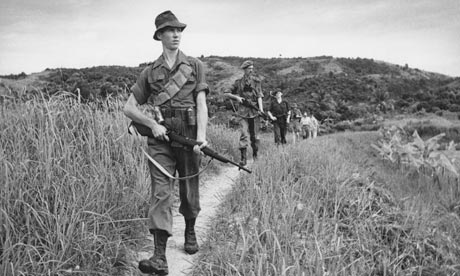Senior British diplomats introduced an extraordinary "licence to kill" law in an attempt to legalise retrospectively the colonial-era killing of 24 villagers by UK troops in Malaysia, the Observer can reveal.
The Batang Kali massacre took place on 12 December 1948, as British troops carried out a counter-insurgency operation against Chinese Malayan communists. The shootings took place after a 16-man patrol group of Scots Guards surrounded a rubber estate at Sunga Rimoh by the Batang Kali river. The bodies of several unarmed villagers were reportedly mutilated and the village was burned to the ground.
An informal investigation of the incident, carried out in 1949, exonerated all the soldiers involved. But claims of a cover-up by families of the victims have ensured that the killings in the village of Batang Kali remain one of the most contentious in British colonial history.
Some have described the episode as "Britain's My Lai," a reference to the murders of Vietnamese villagers by US forces in Vietnam. The campaign for a thorough investigation into the incident will reach a climax in London this week when a court will finally rule on whether to open an official inquiry into the killings. Although some of the Scots Guardsmen are still alive, the victims' families are not seeking criminal prosecutions.
Ahead of the hearing, the Observer has seen documents revealing that after the killings the British authorities hastily passed a regulation empowering troops in the country to use "lethal force" to prevent escape attempts.
According to papers recovered from previously secret Foreign Office archives at Hanslope Park, Buckinghamshire, Regulation 27A was unveiled on 20 January 1949 by Sir Alec Newboult, chief secretary of what was then Malaya, little more than a month after the alleged massacre. They show that Newboult's command authorised "the use of lethal weapons" to "prevent the escape from arrest," so long as a warning was issued first. It explains that the law is applicable to any "officer" belonging to the UK military serving in Malaya.
Tellingly, the regulation has retrospective power, specifying that any "act or thing done before the coming into force of this regulation" should be covered by the command.
The Foreign Office and the Ministry of Defence have said the 24 Chinese labourers were shot while trying to escape detention, an account since questioned by the majority of the soldiers involved.
The sudden drafting of the new regulation, disclosed now for the first time, has been interpreted by lawyers as a clumsy bid to render lawful the killings that had already occurred.
John Halford, of law firm Bindmans, which is representing families of the victims, said: "In their own way, the British officials responsible for Regulation 27A were making legal history, but in the most insidious and immoral way imaginable. This law was carefully crafted to immunise those involved in the killings from the legal consequences of their actions. It was an attempt to use the statute book to excuse and legitimise an atrocity that could never withstand the scrutiny of a court."
The new law also sought to extend the use of lethal force against individuals suspected of merely "consorting" with a person possessing firearms. No weapons were ever found at Batang Kali.
Chin Peng, leader of the communist insurgency, now aged 90, has stated that no one in the village was linked to the guerrillas. At the time, the Batang Kali shootings were celebrated as a victory against the rebels.
Last month it emerged that thousands of documents detailing some of the most unsavoury acts committed during the final years of the British empire were missing. Although papers relating to the Malayan Emergency survive, documents relating to the events at Batang Kali appear to be among those lost, including the first testimonies of the soldiers involved in the killings.
One piece of evidence which will emerge in the divisional court this week details a Malaysian police inquiry conducted in the 1990s, an investigation that was aborted after Foreign Office officials intervened.
A previous inquiry launched in 1970, with a special Scotland Yard task team, was "terminated" by the incoming Tory government. In the same year the People newspaper quoted one of the Scots Guards involved as saying: "Once we started firing we seemed to go mad."
Some of those involved later admitted they had given false accounts to ensure the Guardsmen were absolved.
Lawyers for the families of the 24 victims will claim that unarmed villagers were murdered in cold blood, and that the truth about the killings has been suppressed.
http://www.guardian.co.uk/world/2012/may/06/britain-batang-kali-massacre-malaysia
